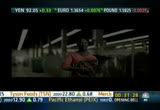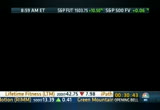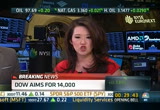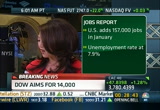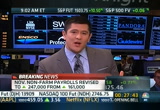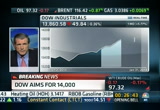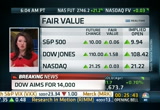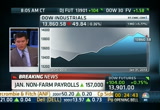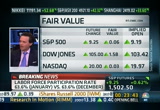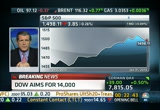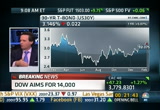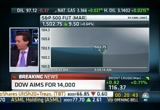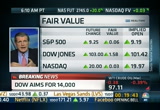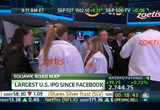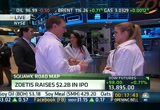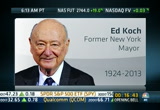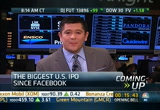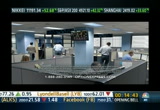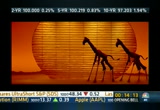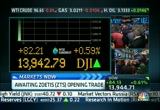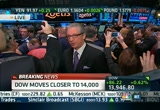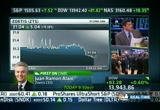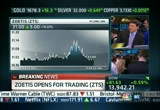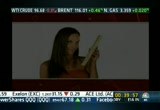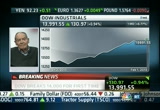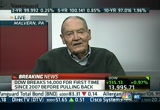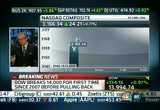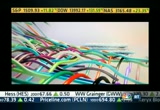tv Squawk on the Street CNBC February 1, 2013 9:00am-12:00pm EST
9:00 am
9:01 am
there. but you really do see some opportunities. >> i really do. it's interesting, we talk about the jobs report, 158, good or bad. we talk about gdp, minus one, plus one. all that is a power point. our economy is sluggish today, and there's no reason for it. we have a wonderful country. we have great resources, we still have a free world, the opportunity to move forward. here's my message to the leadership in washington, get in the game. >> thank you. >> join us on monday. have a great weekend. "squawk on the street" starts right now. we have breaking news on this jobs friday. welcome to "squawk on the street." i'm melissa lee, with carl quintanilla and david faber. we're closing in on 14,000. a leg higher in futures just moments ago. the dow looking at 112 points at the open. the s&p 500 looking at about 11
9:02 am
at the open. of course, this is after the best month for january, since january of 1987. as for the picture over in europe, taking the lead from here in the united states in terms of gains, we do see the cap up by 1.3%, and the dax in germany up .6 of 1%. in asia, the real star is the nikkei, embarking on 12-week winning streak with the yen weakening down to 92 versus the u.s. dollar. of course, the road map here starts with the all-important jobs report. and the dow nearing 14,000. the u.s. adding 157,000 jobs in january with the unemployment rate ticking up to 7.9%, despite the partisan nonpayroll jobs. a large part of the jobs coming in the final months of the year. >> we want to take a closer look at what the jobs number says about the economy and mashlgs. art is here.
9:03 am
happy friday t. is a happy friday to some degree, joe. your take not just on the month, but on some of these revisions, three-month average now, over 200 k. >> 200 k, in january, three-month moving average. december is also 200,000, 201,000 moving average. i wouldn't say this is a boom, but the economy looks a lot better after the fact. it tells me two things, number one, this momentum will carry into the new year. because with better data, we know the economy was a lot healthier. we also know that people have more income and they're probably going to be able to withstand this tax hike on the payroll side better than we thought. and people should start revising their numbers higher. >> in the last few days we wouldn't know whether we would reverse this winning streak or not. does this set us up for 1515, 1530, what? think it does. i think the only problem, carl,
9:04 am
a start as quickly as we have so far this year, everybody's looking for that catalyst to pull back. we didn't get it today. as we head into next week, we sort of fall into that post-earnings quiet period. there's not a lot of economic data. so unfortunately our next focus will be down the road a little bit to washington, d.c. they could start the whole theater of, could we get something resolved on the sequestration and move forward there. yeah, i think this is great news. i certainly think the estimates for the u.s. economy will start probably working higher with the four months in a row of an average of creating 200,000 jobs. you know, the only problem here is that, for all those folks that sold out of equities at the end of last year because they were afraid of the fiscal cliff and missed the next 5%, 6%, 7% of the move, that may stymie some of the funds we see. >> to art's point, you've been bullish. but do you think the risk is to the outside? do you think it might be too
9:05 am
early? sequestration is looming large. there could be a real impact on q-2. >> i don't, melissa. for the simple reason we talked about the fiscal cliff would hurt the economy. and it didn't. it didn't hurt the job market in the fourth quarter, it didn't hurt capital spending. gdp was weak but it was all because of the drought, the hurricane and maybe the sequestration, which large part we already got. i think as we look to 2013, and i'm going to butcher the quote from my colleague, when you have januarys that rise this much, the gains for the year are around 25%. so i think we're waiting for a pullback to try to be too clever. >> art, in terms of positioning for 2013, where are you looking to? do you start a rotation? we certainly see a lot of money go into the small cap, the mid caps, the transports, which have all hit recent record highs. do you see movement from that
9:06 am
into tech areas? >> i think the transition in '13 is certainly going to be health care. health care had a very good january. technology is going to be one 6 the leadership sectors. it's probably going to take over the leadership from financials. if you look at leadership in '13, focus on consumer discretionary, technology and health care, the three drivers. six months from now i think you'll see a majority of the flow is not yet in the sectors, they'll start to come in. the other thing to think about, too, if you look at the fun flow data, january was the first time we saw significantly more money of bond funds. since 2007. first time we've >> joe, private sector for the quarter, 675. the second strongest quarter of the recovery for private. >> right. >> does this make the gdp number, does that put a nail in that number? >> yes, absolutely. we thought it did before hand, because i mentioned the private
9:07 am
demand was so strong. i'm chuckling because as you're saying this, i'm looking at the fed and thinking to myself, this is like new year's eve, we're going to party like it's 1999, and we've just drank a lot of booze and now we're doing tequila shots. they just got the pedal pressed so far down, i think it's going to end badly. >> why do you say it's going to end badly? >> when rates go higher, they're going to go so much higher than people anticipate, and it will cause so am collateral damage -- not all fed people, but i think the fed is completely underestimating the financial stability issues of this balance sheet. >> maybe they should be moving rates higher than the 6.5% base? >> i think they need to step back a little bit. they're going down i-95 at 150 miles an hour. just do 100. you'll still get pulled over, but -- >> and -- >> and they're texting at the same time.
9:08 am
it will be worse than '94. because we've had real rates negative longer. people have reached for yield. we're seeing various little bubbles pop up in ancillary markets where people are just literally reaching for yield. it will definitely be worse than '94, no question. the timing is just, when does it happen. >> art, are you as pessimistic on that front? love joe's analogy. it's a friday and he's talking about both drinking tequila and driving over the speed limit. spectacular. what you have to focus on here is, although the fed told us when they'll start pulling back the punch bowl, whether that's 6.5% unemployment or 2.5% inflation, that doesn't mean that's when they start. i think this is the year we'll start seeing them at least, at the very least on a monthly basis trim back on what they're doing in quantitative easing. they'll do it long before we get to 6.5%. we'll not do it the month we hit 6.5%, because that may not be in
9:09 am
the the second half of 2014. >> would you agree, joe, we've moved off of thinking about calendar in terms of rate hikes and more toward data, back -- >> absolutely. >> that's a step in the right direction. >> a baby step. when bernanke gave the speech in september last year, the numbers were 89,000. he said what we've seen doesn't constitute material improvement. they wound up having us ask a lot more questions. what's meaningful improvement. if 200,000 month isn't meaningful improvement, i don't know what is. >> what do you need to keep up with new interest, right? >> this is the thing. this is the critical mistake is the fed's making. they're assuming full employment is below 6%. i think it's 6.5%, maybe 7%. i was arguing with goldsby about that, there's a mismatch in the economy, inflation will start sooner, and i think the fed is completely misrepresenting or
9:10 am
misunderstanding where the potential is. >> doesn't the fed, though -- if the fed is finally giving us a target of 6.5%, do you see the fed doing anything before 6.5%? >> probably not. i think they're very dovish. unless they flinch, melissa, i think you're right. that's why i think the leverage in the system and the unwind will be that much worse, because until the fed does it, there's going to be a huge flop for investors. we're saying, look, the fed is giving us the all clear and we'll not worry about it. >> is that going to be net destructive to equities? >> it will initially. unless the economy's rolling over, no. eventually equities will get hit like in '94. that's when you get the rotation from bonds into stocks. >> at least we've had that to a certain extent already. >> a little bit, david. >> reversing what was an anomalous period the last five years, some would argue. >> yes. >> along these lines, if you're a believer in this, and that there are inflationary
9:11 am
pressures, and pressure on certain areas of equities, would you still -- you want to be long consumer discretionary 2013? >> you know what, i think you bring up a good point. haven't seen inflation in the things that we need. we've seen inflation in the things that we want. right now, there are things we want are things like iphones and ipads, and, you know, technology devices. not in things like education and energy and that's the only sign of inflation. but to joe's point, i think the fed can back off on what they've said if in fact we've seen them pull back. they can walk away from the 6.5% unemployment target and wind down quantitative easing in a much more rapid pace. i think that's a step in the right direction, so it doesn't have to be a train wreck. this could be a gradual pullback of easing where interest rates start going up in the first part
9:12 am
of 2014. >> we've been talking about pulling this band aid off for so long. carl, it's like housing, though. schiller wrote a piece in the journal, they said it lasted five years. that was painful. but boy, when it reversed, it was more painful than that time with which you're waiting for it to happen. >> joe, art, thanks, guys. good stuff. >> thank you. >> trading debut here at the nyse today. becoming the largest ipo from a u.s. company since facebook. shares of zoetis is trading at $26 apiece. it's the only way to play it in a pure way, because the other animal medicine companies out there owned by larger pharmaceuticals companies. you see here people getting ready for this ipo. very big event down here this morning. >> a huge group outside waiting to get in. waiting in security from the
9:13 am
company. so we do expect a fairly robust showing here. in terms of at least people applauding. we'll see how the stock actually performs. chris, don't forget this is part of pfizer simplifying as well. >> exactly. >>s they will continue to hold the bulk of the shares. but they are selling about 17% of the company in this ipo. again, the largest since facebook. >> 27% of revenues coming from brazil, india, and china. it will be one we will watch closely here at the nyse today. >> we're hoping for animals on the floor. >> oh, yeah. >> it would be nice, right? >> livestock is a big bulk of their revenue, so a goat or something. >> we also do have sad news today. former new york mayor ed koch passing away early this morning from congestive heart failure. he was 88 years old. koch led new york city for 12 years, known for saving the city from financial ruin.
9:14 am
michael bloomberg saying in a statement the city has lost an icon. a cheerleader, champion, 5,000-word oh bit in the "times" today, words like pugnacious, tenacious, outspoken. david, you know his story pretty well. he really did set the stage for giuliani to change the city. >> yeah, he was the consummate new yorker. of course, living in his apartment not far from here, in greenwich village for so many years. not everybody in the community, but many would say, our mayor. when he came into the office in '78, the city was at or near its nader. i can remember it well at that time, of course. and we did grow a great deal under his mayorality. not without some scandal, but certainly with a great deal of enthusiasm. in many ways he brought the spirit back and made you feel good about being a new yorker. which is not easy to do, when
9:15 am
you had lived through the '70s. >> he passes on a day where a new biography, a film biography of him opens. something somebody said is the kochiest thing he could have possibly done. >> i've seen it. a friend of mine directed it. and, yeah, timing is great. it's also actually a great history of new york, and also, of this incredible man. >> grand central turns 100 today. an institution, a building that nearly went away, and could have gone away under his administration. he saved that. his inscription is going to have danny pearl's final words, my father was jewish, my mother was jewish, i am jewish. he will be missed. the biggest ipo since facebook, pfizer taking its animal business public today. also ahead, white house economic adviser allen krueger, his reaction to this morning's job numbers and revisions. futures, triple digit, off the
9:16 am
highs, barely triple digit now. options trading. we create easy to use, powerful trading tools for all. look at these streaming charts! they're totally customizable and they let you visualize what might happen next. that's genius! strategies, chains, positions. we put 'em all on one screen! could we make placing a trade any easier? mmmm...could we?
9:17 am
9:19 am
. welcome back to "squawk on the street." i'm sharon epperson. we are looking at an explosion in turkey, in front of the turkish embassy. the capital there in turkey. the u.s. embassy there, with the explosion in front of it, the concern about what is happening in turkey. turkey, of course, being a major player in terms of the transit of oil, with oil pipelines going from northern iraq to turkey, that export it out to europe and elsewhere in the middle east. that is something that is contributing to the rise in oil price today. brent crude at a fresh 3 1/2-month high, $116 a barrel. we're also looking at the spread between brent and wti prices at a high level, near $19. news that the seaway pipeline bottle neck may not be rectified until the fourth quarter. >> sharon, between ankara, the explosions at pemex, you'll have a busy day. >> exactly.
9:20 am
>> now to a rare inside look at an exclusive club, tiger 21, made up of roughly 21 members that collectively manage about $18 million in investable assets. gary brings us that access from palm beach. hello, gary. >> good morning. carl. we're getting exclusive asset to some of the greatest investors in the world. what they're telling this group, and it started yesterday with the relegendary real estate investor. hear what he had to say. >> i'm less optimistic about how terrific this housing recovery is. i think that there's a significant number of houses that are still, quote unquote, in peurgatory. i don't see that kind of, you know, enthusiasm that you see in the newspapers every day.
9:21 am
the public does not reward you for one-time gains. a single-family business is not a lot of cash flow, it's about one-time gains. maybe it is a viable investment, but i don't think it will be a great public investment. >> and there you go, carl. clearly the stocks, in his opinion, the housing stocks, that is, way ahead of themselves. it's important to remember, sam zell sold equities at the top of the market in 2004. to blackstone. and so he has had a very good background in terms of timing, in certain real estate areas. as negative as he is in terms of the housing market, ironically he's extremely bullish on the multifamily and public residential. they just did a big deal buying the arch stone deal from the lehman estate. the deal that actually took lehman down. i must tell you, he is as optimistic as he's been in any investment with eqr and what he
9:22 am
sees with this deal. he bought at absolute bottom, guys. >> gary, we'll check with you later on. we are waiting a major ipo at the new york stock exchange. the biggest ipo since facebook. pfizer is taking its animal health business public today. we'll talk live to the voesmt of zoetis later on. and for some, food for thought. >> still ahead, it's super bull weekend. you already chose who you want to win. and you know where you're going to watch. but did you decide what you're going to eat? the ceos of buffalo wild wings, and domino's will join us this morning. with their thoughts on the big game and much more. later on "squawk on the street." this is for real this time. step seven point two one two. verify and lock. command is locked. five seconds. three, two, one.
9:23 am
9:25 am
six minutes before the bell rings on wall street. art, the number, even better revisions. so what do you make of the economy in the markets here? >> it's run a little counter to what we saw with the gdp. people are beginning to excuse away the gdp and the fact that after sandy and a few other things we basically did nothing but draw down inventory. and that was a big chunk of it. so we'll see. right now, the optimism is holding. i don't know if we'll have enough strength to go to 14,000, but i'm going to be looking at the recent high in the s&p, which is 1509, 1510, we get up
9:26 am
around there, they can get a little extra push. >> you seem skeptical of the optimism. >> well, you know, we've had mood swings pretty big here over the past several days. and the nonfarm payrolls is a somewhat suspect number to begin with. we used to call it the random number generator. it would come out and a month or two later it would be revised sharply. so we treat that with a slight degree of skepticism around here. >> what about flows? 5.78 billion. equities, a lot since we've seen that. >> it is, and it's good. again, looking at the skeptical side of things, it's been decreasing, however. you were up in the 14s, then the 7s, now you're in the 5s and 4s. is it the beginning of the year, that flow just moving in and
9:27 am
slowing down? wee see how we do in the month of february. but it looks like a good start. >> interesting. five straight weeks up to start the year. which we did last year, believe it or not. >> yeah. the seasonal patterns are good. and we've got the super bowl this weekend. and whoever wins, according to the super bowl indicator, we're okay. they're both nfl franchises, nfc franchises from the old days. so far the bulls have everything flowing for them. unless the groundhog knows something we don't know. >> art banks, enjoy marinating mode. we'll see you next week. what message is the white house sending about the jobs numbers today. we'll have a live interview with one of the president's top economic advisers. the biggest ipo since facebook. pfizer's animal health company zoetis. the ceo ringing the opening
9:30 am
♪ many hot dogs are within you. try pepto-bismol to-go, it's the power of pepto, but it fits in your pocket. now tell the world daniel... of pepto-bismol to-go. bob will retire when he's 153, which would be fine if bob were a vampire. but he's not. ♪ he's an architect with two kids and a mortgage. luckily, he found someone who gave him a fresh perspective on his portfolio. and with some planning and effort, hopefully bob can retire at a more appropriate age. it's not rocket science. it's just common sense. from td ameritrade.
9:31 am
we've got people in the rafters, literally today, as we await the ipo of zoetis, pfizer's animal health unit. biggest ipo here since facebook, on a day after the dow's best january since 1994. better than expected revisions to jobs. it's going to be a big day. not to mention the public offering. big day. zoetis, pfizer, celebrating its ipo. the ceo of the animal health company is coming to post 9 in a few moments. over at the nasdaq, the american heart association is go women movement, celebrating national red day to raise awareness for women's heart disease. we have barely gotten to some of the big stocks moving today. >> we had exxon mobil, helped by refining margins. that is the story in the oil patch for the third and fourth quarter. refining is where the sweet spot is. we've seen a lot of refiners have amazing runs this year.
9:32 am
certainly we're watching that one. >> 2012 for exxon, the second best year since they set a record in '08. earnings of $44.9 billion. earnings $44.9 billion. they've taken so many knocks for mistiming, some say, natural gas prices. but clearly their portfolio is able to make up for some of that weakness. >> it's a behemoth that keeps lumbering on. apple also earns a lot of money, too. they're neck and neck as to what they put up in the early numbers. >> that is true. apple, by the way, since we're mentioning that stock, is higher by .6%. even with the launch of the ipad mini in the fourth quarter, apple actually lost market share as a percentage of the total tablet market, while samsung gained that share. apple is still the dominant player. but samsung making real inroads
9:33 am
in the fourth quarter, despite the launch of the ipad mini. apple trading higher by .4%. >> we haven't done merck. 8g 3 cents a share, 2 cents ahead. rapidly advancing products, labels first in class through the pipeline. i'm sure if jim were here, he would have some more informed opinions. >> the thing about merck, as we're watching the stock trade lower by 2.3%, it's put off submitting its bone-building drug. that was anticipated to happen no later than mid-2013. of course, it is one of many pharmas that are going up against this patent exclusivity for singulair in august. that drug down by 67%. a drug setback on bone building drug, seen as a negative for
9:34 am
merck. >> david, don't want to steal from the faber report, but dell is the biggest gainer on the s&p. >> we'll save clearwire for the next report. on dell, the deal is getting close, and they're saying it will be close to 14. again, my reporting remains what it has been, which is that the range for the deal itself, when and if it's announced, will be between $13.50 and $14 a share. sources do indicate they are getting closer. you might see an announcement as soon as monday, or let's call it early next week. there's a lot of complexity to this deal, not just microsoft's potential involvement, but also the desire on the part of the advisers, and the investor here, mr. dell himself, to make sure any potential apparent or perceived conflicts are dealt with. and so you've got a special committee being advised by
9:35 am
jpmorgan. you've got a lot of different things going on. and a lot of ts being crossed and is being dotted to make sure in the light of day it will have so few conflicts about something that is so conflicted. again, my sources indicating that price range that i gave you a while back now, $13.50 to $14 remains in effect. they do expect to announce it as early as next week. of course, michael dell would be perhaps -- would likely be the largest single equity holder in a private dell, again, going to some of the conflicts we talked about. >> the noise down here is unbelievable. zoetis is right behind us. the range 31 to 32. keep in mind, the price last night above the anticipated range, at that price, $26, it would put the market for the company at $13 billion. it looks to open even above the higher price between 31 and 32,
9:36 am
as that spread starts to narrow. we are getting closer to the opening of zoetis, the spin-off of the animal health business from pfizer. quickly on shares of research in motion, for the first day and a couple, it is trading higher in today's session, after the launch of the blackberry 10. in the beer stocks, they're reaping some of the massive losses they say yesterday. anheuser-busch up almost 2%. >> consolation out with a more significant statement that we received yesterday. of course, in terms of their approach to this issuing statement, and further response to the doj action yesterday. of course, they're just basically saying, listen, crown imports, that was the key here. we talked about it a lot yesterday. modelo owns half of crown imports. selling the deal for $8.1 billion to constellation. constellation would be in the position to set the prices and
9:37 am
marketing, all of these beers that are in question, certainly in question by the doj whether it would take out of the market. they're rebutting that. it may well end up in court. we'll see if they can reach some sort of agreement here in terms of inbed and constellation and the doj avoiding going to court. >> a lot of macro data, pmis in the state. china, various -- going two directions, but the hspc pmi up in germany and spain. auto deals in the states as well. phil lebeau with those numbers. >> we have numbers coming in from nord. january auto sales improvement of 21.8% for ford. that is better than what the street estimated. up 20.6%. what we're expecting for the month of january, not just from ford, but all the automakers, a range of sales pace for the industry between 15.2 and 15.4
9:38 am
million. that would be a big start to the year. given the fact that january is typically one of the slowest sales months for the auto industry. ford reporting an increase in january 21.8%, above the estimate of 20.6% increase. >> thank you very much, phil lebeau. bob, this is a big deal when they're right at the post. >> we're getting very close right now. it's looking 31 or so. right around there. it's jumping around here. 31.5 right now. the important thing here is, think animal vaccines. think pets. this industry is growing rapidly. look at the pricing, 22 to 25. $26 pricing. that's impressive number here. $2.2 billion. the biggest ipo we've had since facebook here. we'll be talking to the ceo briefly here.
9:39 am
looking at 31.5 right now. everybody's talking about the strange rally this morning on this very tepid jobs report. i don't know what anybody else would call it. i know a lot of guys are focusing on the upward revisions in november and december. but 157,000 is a pretty lackluster number. the household survey not big either. now that employment is part of the fed's target, maybe the fact that the programs will continue part of it, you remember you get significant ip flows in the market on the first day of the month. a number of traders cited that as well. one of my favorite companies reported this morning, ingersoll-rand. they're all over the place as a company. the important thing for them right now, good numbers. they beat the estimates. but their guidance was very cautious. the ceo, we expect to be in a slow growth economy in 2013, overall. the guidance in the middle of the range here. revenue guidance definitely on the weak side. we'll see a little bit of
9:40 am
weakness there. david you mentioned the inflows in the stock mutual funds. four weeks now inflows into the sto stock mutual funds, biggest since april of 2000. we're still at 31.50 on zoetis. >> we'll come back to you in a little bit. meantime, the country adding 157,000 new jobs in january. unemployment rate rising to 7.9%. joining us from the white house this morning, dr. allen kruger. dr. kruger, good morning. >> good morning. >> we can talk about the month, or we can talk about these revisions. i think the revisions are more interesting. i wonder if you're willing to argue this morning that the labor market is at the beginning of a new leg here. a new leg up. >> yeah, i think today's report is a continuation of a pattern, where we're seeing the job market healing.
9:41 am
it's not back to full health. over the last 35 months we've added jobs. in 2012 the average first job report was 142,000, with all the revisions. it's now 181,000. so january's numbers are in line with what we've been seeing. we just need to keep building on this progress and make sure that washington doesn't give us any self-inflicted wounds. >> with the participation rate not really budging, i'm wondering, are you seeing some signs that americans are more confident in looking for work? are there other internals that point to that? >> if you look at some of the other measures, discouraged workers, they're down over the last year. so the job market has been healing. but we want to see it heal more quickly. we want to see the unemployment rate come down more quickly. that's why the president has supported investing more infrastructure to improve our roads and our highways, improve our productivity in the future. make other steps to strengthen
9:42 am
the economy while we get the deficit under control. >> alan, talk to us about the context of the economy in light of that policy. do you think there's any risk that perhaps the fed might not step away from its policies in terms of buying assets soon enough? >> melissa, as you know, we have a long-standing practice of not commenting on the fed. the federal reserve board is an independent agency. so i'll respectfully decline. but i think what's important is that the administration and congress continue to make the steps to build a stronger economy, an economy that works better for the middle clags and helps put us on a path of a sustainable budget in a balanced way. >> let me put it another way, alan, then. do you think the economy is stronger than what wall street is forecasting right now? in the jobs numbers? >> i think the main risk we face right now is that congressional
9:43 am
gridlock could prevent us from making a step we need to build a stronger economy, an economy that works better for the middle class. we are seeing improvements in the housing sector, since housing was ground zero for the financial crisis. i think that's a very important step. it's important we allow the process of this healing continue and not get in the way. >> dr. krueger, we hear a lot about the skills mismatch. how significant is that, and what if anything can the administration do to try to fill the jobs out there, because we simply don't have the qualified workers for them? >> that's an excellent question. the u.s. has been mismatched for some time, even before the recession. our educational achievement had not kept up with many other advance countries. you look at the technology skills demands at work. we need to improve our education system, our job training system. the president has worked very hard to be innovative in this
9:44 am
area with limited funds. we engage with the business community, with labor, with other experts to try to pursue steps that will help to reduce the skills mismatch. that will be good for companies. that will be good for american families. >> we're getting ism not too far from now. we're still digesting pmi, auto sales. the negative print got a lot of play. the white house, you yourself said the numbers can be volatile. how confident are you that that in fact will be revised up and by how much? >> i won't predict a revision. but when you look at the components of the gdp report. you see a sharp drop in federal defense spending and big inventory swing. those are factors that caused us to have a small negative gdp growth last quarter. i think particularly the federal defense spending is a harbinger of what might happen if the
9:45 am
sequester takes effect. the cuts that no one wants to see happen, would restrain government activity, would be harmful for the economy. we'd like to have a smarter approach to relieve the sequester. >> so finally, in your view, was that just a taste of what another sequester could be like? >> well, as you know, the sequester hasn't started. and we have made proposals to congress to eliminate the sequester. the sequester can certainly have a significant impact on the economy. what we saw in the fourth quarter gdp report was just a big effect on defense spending. >> right. >> possibly advanced planning because of sequester by private contractors and other factors going on. the sequester would also affect nondefense spending, and that could also have a significant impact op the economy. >> dr. krueger, appreciate your time on a busy day, for you and for us. thank you so much. see you next month.
9:46 am
>> thanks for having me. >> alan krueger from the white house. >> hi, rick. >> hi, melissa lee. wow, you know, we are really seeing some buying going on in the treasury complex. quickly go through the major charts interday. 5s, 10s, 30s, all down a half a dozen basis points. 2s out to 30s are lower in yield than they were a week ago. so that's something to pay attention to. foreign exchange, if you look at the euro versus the dollar, fresh 14-month high on the euro side. if you look at the dollar/yen, fresh 30, one-month high, benefit dollar. if you look at the euro/yen, fresh 34-month high, benefit of the euro. we're continuing to see the big currency trends continue. many say they may continue for quite a while. of course, we have more big data today, and i'll be bringing it out for you, david faber, and carl, back to you. >> thanks, rick. see you in a few minutes.
9:47 am
let's hop over to pisani and see how close to an open -- >> it's heating up a little. $31.70 right now. but there's people still putting in bids right over there. a couple of people. this kind of is -- it's very spir spirited, actually. we're seeing bids, they keep trying to get close. the designated mark -- are we frozen? it's now frozen. the book is frozen. and it's going to open right now. hold on. wait a minute. let's see what's going on. there are still orders trying to come in. they're still trying to get orders in here. you can see this is a real auction. people are yelling orders. trying to get last-minute orders in. some to buy, and some to sell. we're still waiting.
9:48 am
we're still waiting. 31.5 now it looks like. all right. now, again -- now they're saying it's -- we're waiting for a final wave here. and we've got it. it's frozen. $31.50. quite an impressive move there. $26 is what it priced at, opened at $31.50. this is the biggest ipo since facebook. this is the largest company in the animal health care industry. think vaccines for your pet, as well as livestock. very happy people standing around. people in the company right out front.
9:49 am
there's the ceo. we'll be talking to him shortly. guys, back to you. >> and bob, we have just witnessed about a $15 billion market company being born here at the new york stock exchange. that's what the valuation puts it at. there was heavy demand for this one. we'll be speaking with the ceo in just mere moments. emerging markets, almost a third of their revenues as well. very interesting read on the global business. >> it is a fascinating study of what pfizer has to do at this point. sales 17%, better than lily's animal unit. pfizer has so much on its table, trying to put something on their docket that will replace the patent protection laws. lipitor, you almost hate to see this business go. but when the strategy is to fix pharma, you've got to get a new blockbuster of your own. >> that is a trend amongst all the big pharmas. they have to shed assets, because they have to be looking for new joint ventures or buying smaller companies, early stages
9:50 am
of development in terms of drugs in order to make up for that cliff shortfall that's looming. >> pfizer, you know, at one point had a big consumer unit in animal health. they have slimmed down. of course, the stock has also responded well over the last year after years of underperformance. but a new ceo, remember, it's not that long ago that jeff kindler, the ceo left the company. and it has performed quite well since then. continuing this plan, as carl said, to slim down, and focus, which apparently is what investors wanted to see. despite the cliff had hit their drug lipitor. >> if jim were here, he would probably mention bristol-myers, and they split off with the baby formula. stock prices to be dealt with. we'll talk to the ceo after a short break. zoetis is public, zts, for a price of $31. be back in a moment. tdd#: 1-800-345-2550 when i'm trading, i'm totally focused.
9:51 am
tdd#: 1-800-345-2550 tdd#: 1-800-345-2550 and the streetsmart edge trading platform from charles schwab... tdd#: 1-800-345-2550 gives me tools that help me find opportunities more easily. tdd#: 1-800-345-2550 i can even access it from the cloud and trade on any computer. tdd#: 1-800-345-2550 and with schwab mobile, tdd#: 1-800-345-2550 i can focus on trading anyplace, anytime. tdd#: 1-800-345-2550 until i choose to focus on something else. tdd#: 1-800-345-2550 all this with no trade minimums. tdd#: 1-800-345-2550 and only $8.95 a trade. tdd#: 1-800-345-2550 open an account with a $50,000 deposit, tdd#: 1-800-345-2550 and get 6 months commission-free trades. tdd#: 1-800-345-2550 call 1-866-294-5373.
9:54 am
higher by about 79 points here. we finished january positively. since 1950, 81% of the time the dow carried gains or losses for the month of january. it finished the same way for the year. which bodes well for the bulls here on wall street. >> especially when it's a 5% better gain for the month. >> exactly. >> as alan krueger is apparently aware. >> exactly. let's talk about today's big ipo here. zoetis, the pfizer spin-off, the biggest ipo since facebook. just moments ago, the animal health company trading under the ticker zts. up about 18% right now. let's bring in the ceo of zoetis juan ramon alaix. thank you for being with us. >> thank you so much. >> what do you make of the $2.2 billion? what do you plan on doing with the money you've raised? >> definitely it's money we got from pfizer. pfizer already decided that it
9:55 am
was a great time for us to be independent. we've been in the company for many years. we build on the strength. we have presence in development and emerging markets. we also have a unique portfolio. we can now become public and can be successful. >> in terms of your growth markets, about 27% of your revenues come from brazil, india as well as china. will those be the engines of zoetis? >> it's also very well balanced between emerging markets and developed markets. the market like the u.s., we have a significant possibility, because they will be exporting meat. this is the growth of the demands will also be very important.
9:56 am
zoetis will be because of our emerging markets. >> you've been public for minutes and people already say you're an acquisition target down the road. how does that feel? >> definitely what we have celebrated today, it's that we are a public company. we are the largest company in the animal health. we have all the capabilities, really, to be auk sesful. we are leading innovation. i think we have all the elements to be successful. >> let's take a quick interruption for consumer sentiment data. >> it's not out yet -- here it is. 73.8. 73.8. this is the january final. the preliminary was 71.3. so this is a nice jump.
9:57 am
and it's the best numbers basically since november when we were in the 80s, if you recall, october, november, both above 82. better than expected. we still have ism. so back to you, carl. >> all right. rick santelli, thank you very much. let's continue our conversation with the ceo of zoetis, the by ipo here at the new york stock exchange. i'm curious, because livestock is the bulk of your revenues. we've heard so much in the past year that the droughts in the midwest are impacting stocks of cattle. is that a concern for investors? should we, you know, if we're looking to invest in zoetis, do we keep track of what the weather patterns are like and how that will impact the next carryover, for instance? >> the drought was the most severe one in 50 or 100 years. but it's only been affecting the industry on one to two points. you can imagine all the
9:58 am
industries having this kind of event. so in our industry, and it's 1 to 2 points of revenue growth. this industry is very resilient. the growth of the operation, i think it will be steady and predictable growth. >> rising controversy about the use of antibiotics in livestock. how does that figure into what you do? i would assume that maybe a positive on some fronts but a negative on others. again, as consumers become more and more aware of that as a factor in their decisions in terms of what they buy. >> so definitely the industry and also zoetis is focused on food safety. so we want our animals to be healthy, but also humans to be healthy. we are an industry where we partner with different agencies
9:59 am
around the world, and we are proud of the quality of our products. we are proud of the innovation that we are bringing. and we make sure that all the quality of products of innovation is translated into the market. we are very committed for providing information to the agent situation. this is progress to make sure the animals are healthy and productive. and to be healthy and live longer. >> thanks for coming by. juan ramon alaix, ceo of zoetis. >> we just got consumer sentiment. a lot more economic data on tap. we'll get the ism just minutes away. jobs, the super bowl and wings, buffalo wild wings ceo sally smith on how the restaurant chain is gearing up for a big weekend. don't go away.
10:02 am
10:03 am
if we look at december construction spending, it was up .9 of 1%. and last month's minus .3 for construction spending, popped above the surface to an increase on a revision of .1 of 1%. generically, most of the data today, if not all the data today, was a bit better than expected, from ism, to university of michigan construction spending, to jobs most specifically based on revisions, benchmark revisions. melissa lee, back to you. >> rick santelli, thank you. on the back of those numbers as well as the consumer sent president numbers earlier, we saw a slight lift to the markets. dow 14,000, we're just about 35 points away from dow 14,000 at this point. the s&p 500 is adding about nine points here, up .6%. the nasdaq is higher by 17.5
10:04 am
points. it's worth noting in terms of large caps, a couple of big ones are providing headwinds to move higher today. apple shares are also lower this morning by .7%. >> as rick said, this morning's been jam packed with data. 157,000 jobs added in january. the unemployment rate climbing to 7.9%. steve liesman joins us with his take. he wasn't kidding. a busy morning. >> yeah, really. hopefully i'll earn my paycheck on a day like today, carl. as rick said, i think the important part was, most of it better than expectations. the construction number, that could help that negative one on gdp. we'll get to jobs in just a second. but also the ism pgoing well. total 157. private sector 166. unemployment ticking up.
10:05 am
hours unchanged at 34.4. earnings up .2. the revisions, 127. i want to talk about that. i want to show you a chart here that takes a look at -- there's the bar chart. there's the old private sector fourth quarter average of 185. and now it's 225,000. but what was the fourth quarter? the fourth quarter was full of fiscal cliff concerns. so doug duncan, an economist at fannie mae, writing this morning, the payrolls in the fourth quarter is consistent with robust growth in business investment in the gdp report. we already saw that. suggesting that uncertainty over fiscal policy did not hurt businesses hiring and investing as feared. if it did hurt it, that means we could be in for better numbers in the months ahead. here's the details of the job report. construction was up, manufacturing a little weaker. we'll see how much the ism tells us about where things are going. retail, 33,000. that's a good sign. leisure/hospitality, here are the negatives out there.
10:06 am
warehousing, temporary not a good sign leading into the future. and of course, government a perennial detractor from business here. relative to the federal reserve, i think if you have this steady to slightly higher unemployment rate and rising, but you have 200,000 jobs being created, kind of the best of both worlds. all that's happened is people are now looking for work. if we have the increase in the labor force, which we didn't have in the months ahead, that could be a good sign. i think the fed remains on hold here. simon? >> thank you very much, steve. let's bring in the chief financial economist at jefferys. thank you for joining us. >> good morning. my pleasure. >> now, i think as far as most of the public is concerned, these figures are stub pbornly low. but i guess the good news is, the glass half full argument is the fiscal cliff in december didn't really hurt the employment picture from where we have been. and indeed, the tax rises that
10:07 am
we had in january, similarly don't appear to have suppressed the job growth either from that relatively low level. would you agree? >> well, the data is a little bit muddled right now for a variety of reasons, including the fiscal cliff. but i think that what we have seen from the data, and this is including the employment numbers this morning, is that the economy is very resilient. that it's healing. that the labor market is zigzagging in the right direction. i would have been happier if the household survey was as encouraging as the establishment survey. but we've had divergences for most of this recovery. >> let's talk about the employment and construction component. are you disappointed that for all the talk about housing recovery from a low base, in construction, and still 2 million jobs down from where we were, but you're not getting better growth there. we're creating more jobs in retail, and arguably more jobs
10:08 am
in health care at the moment than we are in construction. >> right. the construction has started to turn around. we've had two pretty good months now with construction hiring. i think that will continue. and i also think it will accelerate as the housing recovery continues. in fact, i think that's one of the base cases where, despite the fact that i think early in the year we'll see pretty muddled data. the ongoing housing recovery is one reason to be optimistic, that we'll see substantially better growth towards the end of 2013 than we saw at the end of 2012. >> and ward, we want to bring our viewers' attention to the screen, the dow jones industrial average briefly hitting 14,000. we're still on that watch here. we're up by a full percentage point at this time in the session. just shy of the 14,000 mark. >> less than one point. >> less than one point. >> one-quarter of one point. .02. and there it is. >> once again, 14,000 on the
10:09 am
dow. >> the dow hitting 14,000 for the first time since october of 2007. you have no idea how long we've been waiting to use that graphic once again. >> exactly. and -- >> no hats? >> i think second time around you don't do hats. >> should i pull out my hat from last time? >> that would be recycling. >> it's a little dusty. >> what's important is the substantial break we've had on the s&p. i imagine that is what has propelled us higher on the dow. in a sense that the dog being the s&p, in the sense the tail being the -- the dow, still very important, 14,000. that will capture a lot of headlines across the world tomorrow morning. >> a lot of these dow components have nice surges. even in the past 30 minutes. ibm up by almost 1%. microsoft up by 1.4%. these are certainly helping the dow to lift to this new milestone. again, 14,000, just gave it up.
10:10 am
we did cross interday on the dow. i want to bring back in ward mccarthy at jefferies at this point. sorry for the interruption. you said the standard error of the median january forecast is about 115,000. the largest of any month of the year. where is your guess as to where we will be sitting in a month on the revisions to this number, which so many people in the markets are regarding so positively, that we're able to hold the dow to 14,000? >> the revisions tend to reflect what's going on in the economy. and that's why the upward revisions to december i thought were very, very encouraging. so based on that, and the trend that the economy continues to grow, i think we'll probably see upward revisions to the january data. if there are any revisions whatsoever. and of course, the benchmark revisions to march of 2012, were
10:11 am
fairly substantial. the labor market is moving in the right direction. we just wish it could do so faster. >> ward, let me ask you about the financial and the economic implications of dow 14,000. let's assume we keep and maybe close above that later in the session and it makes headlines around the world. we've seen money coming in from retail investors, increasingly into the stock market. what is the effect of these sort of headlines, this sort of market move? does it change the dynamic on the equity culture and the wealth effect for many americans moving forward? >> well, it should. the more the stock market increases, the wealthier americans will be. we are also seeing a situation where investors have been very cautious. the fed has been doing qe to try to get investors to be less cautious and take more risk. at this particular point in time, the stock market seems like it's the perfect place to take risk. and at jefferies we're very
10:12 am
optimistic about the stock market. >> what is your target? >> higher. i don't know -- >> all right, ward, good to see you. have a great weekend. >> thank you. >> one of the smartest answers to any question we've ever asked. nice work, ward. let's bring in the vanguard founder. jack, happy friday to you. good morning. >> good morning. and thank you. >> i think the most pertinent question to ask you is really regarding flow. and whether or not you think this year, as we start to see some movement into mutual funds, into equity etfs, is this the beginning of the real thing? has mom and pop really got religion now? >> i think the answer to that is no. january is seasonally a very good month, as halls been with the year-end reinvestment and pension contributions, has been a very good month for mutual funds.
10:13 am
it's better than it was in the summer and autumn and winter. just last year. and so it's not the big pop that one would think you'd get. i, for one, think that's good. you know, when mutual fund investors pile into equities, it's usually a very negative sign for the market. so something like the dow going 14,000, i can contain my enthusiasm about that. it doesn't mean very much. >> and a lot of people have pointed out some of the records that we broke this month -- or i should say january, sort of were a reminder of the last time we set those records, which not too happy days were soon to follow, jack. >> well, yeah, you're right about that. it's even more dramatic if you go beyond the dow which has its advantages, and great limits. you go to the nasdaq, and that index is around 4,700 at its high in 2000. and now it's -- you tell me,
10:14 am
3,200 maybe. it's still fully a third below where it was at its high. so the signs are mixed. i don't think the economic signs are going to change very much. the path of our economy, which i think 2% real gdp growth in the year 2013 is not a bad target. maybe 2.5%. and that hasn't changed. whether the dow is 14,000 or 12,000 or 16,000. >> jack, can i just push back very gently on the idea that retail investors are very bad at picking when to enter and exit the markets. on the normal cycle that is blat ently obvious. but don't you think it's very different this time, because the trough was so gratuitous, and because now arguably we've removed a lot of those real big threats to the economy, and therefore, it is a sea change perhaps in opinion that we've not witnessed for many decades, from dire pessimism not so long
10:15 am
ago to perhaps a lot of blue sky now? >> well, i mean, i think you're right on that. and i guess what i'm suggesting is, when the retail investors think it's all blue sky out there, we could all too well be looking for a big pullout. it's very counterintuitive. they were pulling money out by the hundreds of billions back at the lows in february of 2009, and now they're -- the book markets are up, the nasdaq and dow both, up 100% since then. almost 100%. now they're putting it in 100% later. and that's counterintuitive, in terms of investment success. >> jack, what do you think is holding back retail? is it a demographic issue? we just don't have as many people who are in the active work force, you have to plan for retirement? is this having touched the hot stove prior to the crisis before? what do you think is tempering
10:16 am
enthusiasm? aside from -- data aside, empirical evidence aside. >> well, you know, your hot stove example is really good. mark twain said something like, when a cat sits on a hot stove, he'll never sit on a hot stove again, but he won't sit on a cold stove either. he doesn't know the difference. mark twain's eloquence comes in to help us at this point. i think actually what's going on with the retail investors is they've lost confidence in active management. and that's why you see these flows pouring into the index funds and pouring out of actively managed funds. and that's a trend that's going to persist. they feel burned by paying all that money, for getting poor returns. they lost a lot of trust in the market. they came in thinking the market had a low risk, and now it turns out it has a high risk. the other thing i would say to all investors is, it seems very, very likely that over a decade,
10:17 am
and i don't look at days very often, but over a decade stocks should give us a return of something like 7% a year. just based on 2% dividend yield, and the 5% likely earnings growth, and bonds are going to give us about 2.5%. over the next decade, that's going to be 100% return on stocks, if those expectations are realized and about 35% return on bonds. people should be thinking about stocks as return generators and income generators, where in the previous market it was bonds that had been heavy lifting. >> that's a good point. final question -- >> jack, we don't normally turn to you for fed discussions. but i wonder, we've had an argument this morning about whether or not a reversal in accommodation from the fed can be orderly, or does it have to be painful? is that the one sort of unspoken danger that people aren't paying enough attention to, how the fed unwinds this?
10:18 am
>> yeah, i think that is a danger. and i also question, first of all, the basis for fed policy. they want to, and have been acting with some success on raising asset prices. but why would one raise asset prices in the stock market if they're very low raising them, but using them in a counterintuitive exercise. i don't know if anybody down there knows whether they're low or high at any time. i think the fed should try to stay out of trying to influence the stock market. i think let the market decide. >> jack, thank you for your time. jack bogel. >> good to be with you all. >> we want to check in with bob pisani. while everybody's watching 14,000, we quietly on the s&p 500 hit an annual high 1510, on the s&p, which is what everyone had been watching. finally, broke through the
10:19 am
level. >> maybe 60 points, i think, away from a new high, historic high on the s&p 500. we did hit 14,000, just barely, 14,000.9. a lot of traders were curious about this morning coming up and saying, this is a pretty tepid jobs report. why did it happen. i think most of the other guys, everybody agreed, focused on the revisions for november and december. the significant revisions on the upside. the bond market value a little bit. and of course, the fed watching these unemployment numbers. clearly indicated that they're going to continue their programs of quantitative easing. i think a lot of people mentioned that. remember, too, melissa, the first day of the month, traditionally you do get strong inflows. you get money coming in, that also factors. earnings not hurting things overall. i would call it a great earnings season. we're heading toward 5% to 6% growth earnings.
10:20 am
from zero revenues in the third quarter, melissa, now we're looking towards 3%, maybe 4%. the bottom line is not great, but better. a trough clearly in the third quarter for earnings. back to you. >> thank you very much, bob pisani. of course, as you noticed, the markets crossing the 14,000 level briefly. much more on this rally right after this break. [ male announcer ] how can power consumption in china, impact wool exports from new zealand, textile production in spain, and the use of medical technology in the u.s.? at t. rowe price, we understand the connections of a complex, global economy. it's just one reason over 75% of our mutual funds beat their 10-year lipper average. t. rowe price. invest with confidence. request a prospectus or summary prospectus with investment information, risks, fees and expenses to read and consider carefully before investing. you name it...i've hooked it. but there's one...
10:21 am
10:23 am
a heck of a morning. we've had a jobs number, the biggest ipo since facebook, dow 14,000. we want to bring in john to post 9 here. heck of a way to close out the week. >> absolutely. >> some of the signs for clarifying or improving this move in stocks today? >> we're in earnings season. we've got economic data. i think you couple all this together and it's just adding to the fact that this market is wanting and trying to move higher. we get conflicting data coming out of washington. we're starting to see a lot of this momentum money coming back in. what does that mean? the ball is rolling. it's been rolling. the money that has been sitting on the sidelines is slowly coming back into this market. >> we make a lot about dow 14,000, of course.
10:24 am
that on main street is a big number. on wall street, s&p now 1511 is the new number here. how important is that in your view in terms of the market move higher? >> over the last couple of months, a lot of resistance levels have been broken. we don't really get a good grasp of where it's going to go now. if you look at the charts where we've been and where we think it's going to go, the top levels keep getting knocked down. i think from down here, we don't look at the numbers as far as the monumental numbers that we keep passing in the milestone numbers. we're looking at shorter term, what's going to make our markets react to headlines. >> what about the breadth of the rally and where we are on the transports after u.p.s. yesterday. >> when you look at the breadth of the rally there, volume has been coming back to the market. just talking to clients and customers there's been a different type of interest coming back into this market. it seems like everyone was sitting and waiting and anticipating things that will
10:25 am
happen. >> does this reduce the ability of stock pickers to outperform? because so many people will buy etfs, or they will simply buy the momentum, and therefore, that lifts all votes and a lot of people who make their money saying that's a better company than that one have a harder time making a living. >> it's allowed investors to get into broader sectors that are out there, to partake in the rallies that are occurring here. individual stock picking, yes, people have these love/hate relationships with stocks. but now it seems when you're investing broader strokes has helped the mainstream investor. >> some of the skeptics today are arguing we've had a great calendar this week. we're about to enter somewhat of a valley for news. what's going to drive it over the next month or so. >> right, so next week, not a lot of economic data that's there. it's going to be headline driven, i think. we've got middle east stuff happening. europe's been somewhat quiet, pops its head up every once in a while. earnings season, we're still
10:26 am
getting through there. not a bunch of big surprises from there so far. if there's any surprise next week, you might see investors taking short-term profits off the table. >> thanks for stopping by. >> thank you. >> welcome to the program. you said you were bullish coming into the year. you felt the market would re-rate, in other words, that investors would pay increasingly a higher multiple for a given earnings stream. is that what you think you're seeing now? >> yeah, i think that's one part of it, simon. i think there's three main forces sort of driving this thing higher. one is, i think u.s. forecast for growth this year, we're so low coming into the year, with a lot of players being forced to revise higher their growth forecast. that's feeding right through the market. i think secondly, there's rising confidence. particularly in the idea of a sustained recovery. every year of this recovery so far, we've felt that it may end this year. i think people are starting to
10:27 am
elongate their horizons a little bit. europe's better, china's bouncing. as a result of that, valuations are going up, like they did last year. and finally, i think we're bringing pressure to bear on portfolio allocations. people are being forced to revisit as we're causing negative returns in bonds at the same time producing positive returns in equities. many are forced to revisit if they have too much in bonds and not enough in equities. >> jim, at the risk of being irritating, let me point out that europe didn't grow in the fourth quarter. much of europe remains in recession. a lot of people don't believe the numbers coming out of china. >> well, for not growing in the fourth quarter, we produced 201,000 nonfarm payroll jobs a month. if that's a growth, i'll take it every quarter. not to mention housing activity, construction activity that went up, certainly a stock market
10:28 am
which seemed to sniff some growth in the fourth quarter as well. and certainly, europe's in recession, but i think the best thing we've done with europe is calmed it down. people are no longer worrying that the eurozone is going to blow apart and take down the world in a financial calamity. that alone, even if there's no growth out of that region, that alone is freeing up investors to take more risk, it's freeing up businesses to look at expansion plans, whereas last year when they were still fearful of that, they weren't. and certainly the idea of the emerging world reaccelerating is wonderful for multinational companies. >> hey, jim, you know, march is going to roll around quickly, a deadline in d.c. another one in may. we know the kind of damage that congress can sustain on the markets. we had a respite from policy risk, but it will come back. >> yeah. i don't think it's going to go away. i think, though, we have -- there's a lot of evidence, carl, in my view, that the market, and
10:29 am
players have really desensitized to armageddon stories. the vix blew out to 45 in 2010, and 45 in 2011 when we lost our aaa rating. it barely got above 20 for most of the year last year. even though we had all kind of armageddon stories. recession in the united states and uncertain election, a hard landing in china, a fiscal cliff. i just think the euro has cried one too many times about the end of the world and the markets are moving on. so we're still going to get this stuff, but i think it's going to be less and less damaging. >> it is an important milestone in the markets. jim, thank you for joining us. >> thank you. >> jim paulsen from wells capital management. >> the dow briefly crossing over 14,000. is it going to get back there again? as we backed off 15 points? computers having a lot of fun today with some of these. a lot more after the break. l sto mission a for a final go.
10:30 am
this is for real this time. step seven point two one two. verify and lock. command is locked. five seconds. three, two, one. standing by for capture. the most innovative software on the planet... dragon is captured. is connecting today's leading companies to places beyond it. siemens. answers. how do traders using technical analysis streamline their process? at fidelity, we do it by merging two tools into one. combining your customized charts with leading-edge analysis tools from recognia so you can quickly spot key trends and possible entry and exit points. we like this idea so much that we've applied for a patent. i'm colin beck of fidelity investments. our integrated technical analysis is one more innovative reason serious investors are choosing fidelity. now get 200 free trades when you open an account.
10:32 am
about an hour in trading, some of the stories we're stalking about. the u.s. creating a total of 157,000 jobs in january. while the unemployment rate ticked up slightly to 7.9. the figures coming broadly in line with expectations. the ism manufacturing index rising to 53.1. economists expected it to tick
10:33 am
lower. the auto sector, ford and chrysler posting strong gains. ford's strongest january since '06 and chrysler's best in over five years. >> the dow crossing 14,000 moments ago. s&p 500 hitting fresh annual high. that new high, 1511. more on the markets. let's bring in tobias levkovich with citi. the confirmation i would say, of the s&p 500, to the dow's move, is important in your view. >> look, i think a lot of the -- it's a confirmation of a lot of things. the data cited before on the jobs and ism, historically we found credit conditions lead business investment community by nine months. you could start to see this happen in the early part to mid part of last year. credit conditions sort of improving from the really struggle period in late '11 when we saw the sovereign risk develop in europe. this is actually on cue. we should have seen industrial activity picking up, jobs
10:34 am
picking up. it's doing exactly what it normally does. getting the confirmation on the markets, the markets were picking up this scent, if you want to call it that. things are getting better economically already. >> in terms of beginning this milestone, it's important to look back, the last time we hit it was '07. take a look at valuations, s&p right now was 14. back then it was 15.9. today companies have much more cash on the balance sheet. they're more positioned to make some money. what's your view in the differences between the milestone this time and 14,000 in '07? >> we look at three different things. i mentioned the credit conditions, they were starting to deteriorate in august of '07. the subprime leaching into the environment. that hasn't happened here anywhere. as you noted, companies are leaner, meaner, and as a result, can handle any kind of volatility much better. they've learned, unfortunately, through a very bad experience
10:35 am
how to do that. number three, parts of the world are not participating. europe economically, china picking up now from a lower point, countries like india struggling. so there are other parts of the world that could do better and join in on the earnings growth. the last one, an an important one, is what are your comparative yields elsewhere. where are your alternatives in terms of investing. and the valuation today, if you look at what we call the normalized earnings gap, take 10-year average earnings, inverted pe, you look at the bond yield five years into the future based on futures contract, you're at a level now that would argue 97% of the market gains in the next six months. >> let me pick up on that yield argument. because the logical conclusion, as sure as day follows night, from what you're saying, this optimism on the stock market and on the economy, is that bond yields have to rise further out. what we call the yield kirv has to steepen. what are the implications of
10:36 am
that? when will it happen and what does that mean in practice for where you put your money? >> yielded from the pure economic point of view, yield curves are good. you tend to generally see a recession follow. we're not there. number two, on the market perspective, certain industries will benefit from that. financials will benefit. you know, insurance companies could invest at a higher yield. it also means that investors owning bonds are going to get hurt. >> doesn't it also mean if you're a company, you can't sort of refinance your debt and buy back stock? >> well, the truth is, not many companies have been doing that. a few of them have, particularly ones that have trapped cash outside the country, who have good balance sheets but can't get to the cash without a tax implication. >> are buybacks a significant -- >> why would you edge the market now. go to the bond market now. raise a lot of money, and then take advantage of the equity
10:37 am
differential. in regards to buybacks, buybacks are important. we've seen the shrinkage. we have seen the shrinkage helping the earnings of several companies. the shares aren't outstanding anymore. >> gold has become a wild card in this. if there's no systemic risk, if there's no inflation and yield on bonds, and there isn't in yield in bullion, they're suggesting you could get a 15% to 20% fall in gold and that could be effectively like the dotcom burst. because so much of the financial system has a lot of gold in it at the moment. a lot of smart money owns gold. a lot of collateral is based on gold. >> i'll answer it in two different ways. i've never been a huge fan of gold. my wife is. but that's a different issue. the more important one is
10:38 am
thinking about, as you say, the financing costs start going up. and in terms of if i have no lost cause in leaving my money in the bank, hurting 15 basis points, i may as well go for the gold, that tends to make some sense. if you start to see that change, the fed is going to anchor rates for a while. i don't buy that argument. but if you look at a 125-year history of the s&p 500 relative to gold, just performance, you're going to see it signaling -- we've only had six signals in 125 years, clearly signaling you want to own stocks over gold. you'll relatively outperform owning stocks over gold in the long term. >> tobias, thanks for stopping by. >> thank you. >> david? >> thanks very much, melissa. i did want to mention clearwire this morning, a stock we have yet to mention, because the proxy on that deal to be acquired by sprint came out early this morning. and in it, first of all, if you're a shareholder, you should take a look. read it. that's why they put these things out. you might expect a voluminous
10:39 am
background section to the merger, which details all the different discussions that took place between clearwire and a host of companies, including briefly at&t, t-mobile, dish, and of course, sprint itself. indicating that there were a lot of different things the company had indicated. party "a," at&t, spectrum sales, jvs, all the different things, prior to their decision to sell themselves to sprint. now, since that time, of course, we have gotten an offer of $3.30 a share. highonal offer, but one nonetheless from dish itself. and charlie ergen, the man who controls that company. as you take a look at what happened here. the stock price is well above that. the real deal is between soft bank and sprint being partners expected to actually -- soft bank expected to own sprint in the not too distant future when that deal closes. the minority shareholders who
10:40 am
stand in the way on the yes deal itself. having spoken to a number of those shareholders, they seem unmoved by anything they've seen in the proxy this morning that would move them more towards accepting the current deal on the table, or perhaps a deal with a bit of a bump to it. very much focused on what they can do to either get dish to increase significantly, sprint to increase, or even take on the potential of bankruptcy down the road. interestingly, in the proxy itself, clearwire does indicate it did not take an $80 million infusion from sprint, that was part of the deal to acquire it, because it had to review the dish deal. special committee for clearwire is in fact doing that, though they remain committed at this point to the current deal on the table from sprint. but the real tension here, between those minority shareholders, by the way, i'm hearing there is another large shareholder who came in at 4.99%. that's where the tension will be when we see the vote down the road on clearwire.
10:41 am
carl, back to you. >> david, thanks for that. we'll have a lot more on the market rally coming up. the dow briefly hitting 14,000. the s&p hitting 1511. let's take a share on zoetis opening for its first day of trading. the biggest ipo since facebook. up 18%. we're back in a minute. otherworldly things. but there are some things i've never seen before. this ge jet engine can understand 5,000 data samples per second. which is good for business. because planes use less fuel, spend less time on the ground and more time in the air. suddenly, faraway places don't seem so...far away. ♪
10:42 am
10:43 am
10:44 am
i'm sharon epperson at the nymex. following the dow reaching 14,000, we have brent crude at its highs of the session near $117 a barrel. prices rising for wti crude. the factor a lot of oil traders are watching is what has happened in turkey. the explosion at the u.s. embassy in ankara is something that has raised the specter of geopolitical risk premium for the oil market. we are looking at the fact that the suicide bomber there, a security guard apparently were killed in the explosion. turkey is key because of the pipeline moves that run through it from iraq to westward, to get the oil out to europe.
10:45 am
and that is something traders are watching very carefully. they're also following the explosion of pemex which is the largest oil company in mexico, in mexico city. another factor that raises that risk premium. we're looking at the spread between brent and wti also blowing out. enterprises announcing that it may be in effect until the fourth quarter of this year. that is something contributing to the spread. but what is probably of most concern to a lot of consumers and drivers here around the country is the fact we're seeing gas prices jump in the national average for gasoline just overnight. $3.46 a gallon is the national average. we'll likely see $3.50 a gallon this weekend. >> that's a record for this time of year, sharon? >> a record for february 1st. it is the biggest overnight jump we've seen in gasoline prices in 23 months. all these refinery issues that we've been talking about, along the east coast, as well as
10:46 am
planned maintenance, many refiners across the country, that is adding to concerns. and gas in demand is ticking up. >> we're heading into the season, that's for sure, sharon. brent hitting new highs. exxon out with earnings this morning as well. with more on the broader oil trade we bring in paul over at deutsche, a hold on exxon, $96 price target. good to see you. >> hi. >> it's amazing how many different fires are brewing in the complex. we start with exxon. production outlook, earnings, what was your take? >> the production is down 5% year over year. that's what adds to all this geopolitical stuff. profits look great. we're at a record oil price average since 2012. all-time record. the fact is, they're really struggling to grow. the same applies to chevron who also reports today. >> a lot of discussion about the diversity of the portfolio being able to offset weakness in nat gas. >> that's true.
10:47 am
but they had fairly good refining results. they got a best in class chemicals business. but exxon came in with a beat. that was a positive. the bottom line is, we want oil growth. and in our position, we're overweight oil since the beginning of the year. what we want is oil leverage. we'll overweight the oils and by extension positive on relatively on exxon. >> speaking of better places, paul, in the refiners, if you look at bo ler o for instance, today hitting a high. it's been a monster run over the past year, up 80% or so. >> right. >> the results from exxon underscore refining is where you make the money. >> right. >> is that a place you want to be in after this big run? >> i wish. we upgraded the group in 2010. we caught a huge part of that move. it worked out great. we thought the pipelines would solve the problems we're seeing here, and frankly, it's just not happening. a big theme emerging for the u.s. is the less geopolitical
10:48 am
risk in wti than brent. that's what we're seeing today. bolero, if you like refining between u.s. crude prices and international crude prices, it can keep running. and keep in mind, 72 is the all-time high. we're not there yet. >> you mentioned geopolitics. algeria, pemex, today ankara. do you see this as themeattic or a series of coincidences around the world? >> i won't predict peace would break out in the middle east. i wish i could. we're shocked by the pemex office. i had a client arranged to visit those offices last week that we canceled at the last minute for several reasons. my father was a diplomat, so these things are very, very concerning about global security. again, it speaks to the idea that the growth in u.s. oil supply, and the sustainability we have in u.s. nat gas is a positive for the u.s. and the u.s. market. i don't think these problems are
10:49 am
going away, i'm afraid. >> we seem to break the link by the qe, printing money by the central banks and commodities. now that the background has changed, do you think they'll say, i'm going to chase oil higher because the fed is still printing money? >> i think the problem there is, i always think of the currencies as an ugly contest. everyone's printing money. what we really look at is the dollar versus the euro, in terms of driving or not driving oil prices. so to me, dollar/euro is a more important driver. >> but it's a one-way bet, isn't it, if the ecb is pulling back and the fed is still -- i mean, your dollar goes higher surely? >> that's fair. as i said, we're bullish. and the fact is that these companies have underperformed the market dramatically in the past year, until the beginning of the year when we did our upgrade, we saw significant underperformance in a group that has hard assets. that is a sort of black gold play, if you like the gold idea. i don't know why you wouldn't do it with oil as well. i agree with you.
10:50 am
>> your target on texas? >> on texas? >> wti. >> oh, sorry, i was going to say, we're not going to texas anytime soon. i could tell you a different story about that. >> yes. >> wti right now, the target is really to be -- we are expecting it to narrow and rally up towards brent. over 110 is our expectation for brent. we were looking for wti to get towards 100. the i think what's going on is making us question that, quite frankly. there's pressure on that spread. and i think there's many reasons, as we've said, for that spread to stay wide. i think we're going to have to look again at how we think about that. generally speaking, overall, upward pressure. >> we covered currencies and geopolitics and a lot more. see you later. >> thanks. >> as we're hitting the new milestones on the markets, more broadly, apple off the session lows moments ago. down by 1% now, so the market's
10:51 am
moving higher in spite of the move lower in shares of apple. also take a look at some of the financials. financials providing leadership today. tracking financials up 1.25%. jpmorgan, one of many financials hitting fresh 52-week highs. >> in the meantime, we are within a rizzo paper -- >> what's that? >> werizzle of paper. >> is that some british something? >> we got almost up to 14,000. >> just asking what the vast number of viewers are thinking. >> and came back down. up next santelli takes a look at how the government spends our hard earned money. you won't want to miss it. # . >> this is gary kamasinski. i'm about to go inside, moderate a panel with kyle bass and back at the top of the 11:00 a.m. hour live on cnbc. kyle bass will tell you exactly what he told this group here about investment strategy ahead. [ male announcer ] you are a business pro.
10:52 am
omnipotent of opportunity. you know how to mix business... with business. and you...rent from national. because only national lets you choose any car in the aisle. and go. you can even take a full-size or above. and still pay the mid-size price. i could get used to this. [ male announcer ] yes, you could business pro. yes, you could. go national. go like a pro. [ construction sounds ] ♪ [ watch ticking ] [ engine revs ] come in. ♪ got the coffee. that was fast. we're outta here. ♪ [ engine revs ] ♪
10:54 am
10:55 am
between 2007 and now? it has been the consumer discretionary sector. within that sector some names making new all time highs this morning. we have auto nation which just told us yesterday that its fourth quarter earnings rose some 20%. another two making historic highs today newscorp and discovery communications. and we'll end with mattel and its highest price since 1998. carl? back to you. >> thanks, josh lipton back at headquarters. let's get to the cme. rick santelli with the santelli exchange on a friday. >> hey, rick. >> hi, carl. listen, we didn't have a bad jobs number today. it was as expected. it wasn't terrific. hasn't been terrific in a while. but it is getting better. the issue isn't that it's getting better. it's time to pop the corks. the issue is that our current revenues based on those working and what they're paying that comes into the coiffers of the
10:56 am
federal government just is not enough. if we look toward what historically have been growth rates in europe they're happy with certainly we are getting close to those but we can't be happy. i'll tell you why. last year, the last fiscal year, and i'm rounding. we're going to make this easy. let's say we took in somewhere, forget it. make it easier. let's say we had a $3.5 trillion budget and out of that we end up with a deficit of $1.1 trillion which is actually the smallest deficit we've had in several plus years. so roughly we're going to round this out. roughly 30%. so for every dollar we spend we're borrowing 30%. i remember when i coined that i think it was on "meet the press" i said we borrow 42 cents for every dollar we spend. you can see how it's come down. on that regard that isn't bad news but here's the problem. let's take medicare/medicaid. m & ms. that's roughly say 23% of the
10:57 am
total 3.5 trillion. all right. now let's take social security. that's roughly 20%. let's take defense. roughly 20%. let's take our interest expense, servicing the debt? currently around 7% but growing. that's about 70%. okay. let me get this straight. 70%. so basically if you look at our last year of data, all the money that we actually took in on the 3.5 trillion goes to these programs which means all other spending, all other spending, and this is the best level it's been at only 30%, all other spending is borrowed money. that's the problem. that's why we can't be happy. that's why european growth rates will keep us in the japanese-like economy for far too long. are there japanese pleased?
10:58 am
not like they're in a horrible depression for the last 18 years but it is not america and not the kind of economy or scenario we need to be proud of. we need to work harder. we are making progress. there's a long way to go. melissa lee back to you. >> thank you, rick santelli. still ahead haven capital's kyle bass sits down with us on the six-year anniversary of a sub prime call. where are we now? he'll join us live from tiger 21 with our own gary kaminsky. [ roasting firewood ]
10:59 am
11:01 am
as we've had a couple important market milestones, dow 14,000, s&p 500, 1511 we're watching shares of apple because they are again just off a session low right now giving up the 450 mark. 449.33 the latest trade down by 1.3%. in spite of apple the markets are moving higher. >> interesting as we were about to 14,000 again it would appear. technology is leading the way. goldman put out a note suggesting in terms of growth and value technology was the way to go for february. >> year to date 16% down on apple still the worst performer year to date on the s&p. >> and the worst january since 2008. >> yeah. see you later on. see you in a few minutes. david have a great weekend and enjoy the game. >> thank you.
11:02 am
you too. >> here's what you missed earlier on if you're just joining us this morning. welcome to hour three of "squawk on the street." here's what's happening so far. >> the demographics are clear between 2000 and 2010, so history, the age group of 55 to 64 grew by 75%. >> wow. >> that's the group that's going to move into the entitlement arena. >> january, nonfarm payrolls increased by 157,000 jobs. 7.9% is the unemployment rate. >> the economy looks a lot better after the fact with these revisions and it tells me two things. number one, this momentum is going to carry into the new year because with better data we know the economy is a lot healthier. >> i think today's report is a continuation of a pattern where we're seeing the job market healing. it's not back to full health.
11:03 am
>> we have innovation and also high quality portfolio value. we have all the elements to be successful. >> 0.02 of a point and there it is. >> once again 14,000 on the dow. >> mutual fund investors, it's usually a very negative sign for the market. so, you know, something like the dow going 14,000 i can contain my enthusiasm about that. doesn't mean very much. >> good friday morning. we're live here at post 9 of the new york stock exchange on a milestone day. get a check on the markets as the dow hits 14,000 for a second time today. first time revisiting that milestone since october of 2007. you can see we're just a hair below at the moment at 13,999. s&p is up to 1510 which might be
11:04 am
the more important number and the nasdaq positive. exxon reporting a 6% rise in quarterly income during the quarter. earnings beat estimates at 220 a share up from 198 the previous year. ford out as well with the january auto sales numbers. u.s. sales were up 22%. sales of the ford fusion leading the way surging nearly 65%. our team is all over this rally, bob pisani standing by on the floor of the exchange. he already walked us through an ipo. liesman walked us through jobs. kate kelly is at headquarters as well. bob? >> i think the important thing everybody is wondering and talking about down here carl is are we going to enter a new secular bull market like the one we had from 1982 to 2000? arguably like the one we've had from 2009 until right now. i think it's very clear right now that we've been doing well because the fed's been keeping interest rates right near zero. there is no other place to put money. that is the theme i hear every single day overall. companies have been doing okay on cost cutting but to get further i think everybody i talked to agrees we've got to do more than that. we've got to do a lot more.
11:05 am
we've got to see revenue increases. more years of no revenue growth isn't going to do what the stock market is not going to do so as i polled people this morning i said what do we need to do to get these revenue increases? it has to do with a lot of macro stuff. clarification from washington on that grand bargain this year. secondly clarification from europe on their banking policies, on their need and move toward more integration. number three, a resumption of growth in the emerging market countries led by china. and, finally, the fed always mentions successfully engineering some kind of modest increase in interest rates without igniting rampant inflation. that's on everybody's list. that's a pretty tall order to get a new sick lahecular bull m. let me point out what has been going on with the ipo of the day. here it is. zoetis. 31.50 it opened at. put up the full screen. very important. 22 to 25 right now. that's what they're talking about. priced at 26. opened at 31.50. $2.2 billion.
11:06 am
this is the biggest ipo since facebook and, carl, the biggest ipo at the new york stock exchange since grupo santander a mexican company back in september. >> we get to our chief economic reporter steve liesman on how much we have the fed to thank and what are we going to do when all the accommodation starts going away? >> i think that's important, carl. i also want to talk about this market seems to be up and near 14,000. for a very simple reason. it's the economy. the economy seems to be doing better. i just wrote down seven things that were on the plus side. a bunch of them this morning. manufacturing, jobs, construction, autos. we got better numbers out of china. financial panic overall seems to be -- have abated a bit. and of course as carl mentioned the fed being wide open. let's take a step back and take a look at the market now and the jobs market now compared to when we were last at 14,000. really ask the question, can stocks be this good if jobs are that bad? you can see we are still below
11:07 am
the level of jobs in the economy that we had when we were last at this 2007 level at 14,000. so i did a little math on this. there are now 2.6 million fewer private sector jobs in the economy. 3 million fewer jobs overall. 2.5 million more people in the labor force. and the unemployment rate is up 3.2 percentage points at 7.9%. is that bad for the stock market? maybe the markets exist as potential down the road. in other words putting these people back to work. another huge consideration. we look at overall corporate profit margins in the economy. this is not just the s&p. this is all companies. you can see when you look at that question, how margins, have they peaked and are they on the way down? because more people are to work or earnings are more of a challenge? those are some things we have to think about when we think about these levels and you guys have already talked about the pe ratio, price earnings ratio being quite a bit lower than it was back at this level.
11:08 am
>> interesting numbers, steve. sort of reminds you how they say history rhymes but does not necessarily repeat itself exactly. >> great point, carl. >> thanks very much. let's get to kate kelly covering fund flows and trying to put the first few weeks of this year into some perspective. >> with the dow hitting new highs today traders are asking a central question. when will the big money start piling back into equities after years of favoring bonds? i'm talking of course about pension funds and other huge institutional investors. there is evidence they may be starting to do so. data from epfr shows that over the last two months the money invested in both equities and bonds is increasing rapidly with the bigger allotment going into stocks. that trend really took off at the beginning of this new year with $22 billion moving into equities during the week that end in january 9th. fund closing the stocks have continued to increase since then though more gradually. still the trend seems to have been slow to build considering bond yields are so low and we've been in a stock market rally more or less since late 2011.
11:09 am
data from merrill lynch suggests the amount of dat money from pension funds decreased to a ten-year low while the rally was taking off while during the same period of time fixed income reached a decade high. pension managers reallocate to stocks arguing we're in the final inning of a three market bull market in bonds. traders i talked to are waiting for the big move any time. some point out money has moved into equities but from the sidelines, from cash, and not actually out of bonds. if the true reallocation starts to happen this bull run could have much further to go. >> wow. we'll get a sense in a minute here with some of the big traders and what they think. thanks so much. speaking of which, want to get back to the tiger 21 conference where gary kaminsky is with kyle bass. of course famously known around the world for predicting the sub prime crisis six years ago. gary, good morning. >> good morning, carl. again, i got to tell you the irony of watching dow 14,000
11:10 am
being here with kyle when i was with him about six years ago as you pointed out and we know what happened at that point. kyle. >> yes. >> we're at 14,000. does this make sense to you? the stock market the place have you to be? >> it makes sense to me but it is not the place i have to be. look, if the monetary base is going to continue to grow at the rate it is growing and the fed is going to hold rates where they are today, you know, we've lost the correlation between stocks and bonds. and the fed is buying 85 billion a month about as much as our fiscal deficit, i think stocks continue to go higher. i mean, when you look at what happened last year, earnings expectations come down and yet we had a p multiple move of two or 2.5 points which generated positive returns in stocks. they should continue to go higher if we keep printing money. >> let's talk about something we just spoke to the group inside about, this group of very sophisticated high network investors. you talked about the stock market but reminded people about equity prices going up. and what happens ultimately with
11:11 am
purchasing power in a highly inflationary world which i know you think is something that is going to happen downtown world. >> i do. >> much like the sub prime crisis. explain to people about how they protect themselves in inflation if equity prices keep going higher. >> i think you kind of lose sight of what's important in my opinion and if you are so focused on nominal pricing and equities and the monetary base is growing as fast as it is, the analogy i drew inside was simply one of the best performing equity markets in the last decades has been zimbabwe but your entire equity portfolio now buys you three eggs? you have to really focus on the insidious nature of what inflation is and how real returns might be negative in both equities and bonds. you're losing purchasing power. >> i asked you in this audience here how you protect yourself from inflation. tell the viewers, how do you protect yourself from the inflation ahead? >> i think cost push inflation is coming. i know the pundits will say the money hasn't moved. it will once the qualitative perceptions of the participants
11:12 am
change. i think to protect yourself you need to own productive assets and you need to own anything like an apartment complex or an oil well or something or a global business that is a productive business that sells things in various different currencies and if you really want to protect yourself you put long-term fixed rate debt on these businesses. just don't put too much debt on these businesses. >> so how -- some sort of asset that generates cash flow and finance it with these low interest rates bernanke is giving us. >> fixed. >> fixed rates. >> yes. >> let's talk about the fed. you had a great quote from one of the european central bankers, what they said about all this money printing going on around the world. >> it wasn't money printing. what the quote was, back in 2011 i guess the point i was trying to make is that the central bankers are trying to do their best to mitigate a bad situation through the financial crisis and where we are today. they only know one thing. they're trying to do the portfolio balancing effect. their one indicator is stocks or one of the main indicators is
11:13 am
stocks. they think the wealth effect will translate into purchasing in the united states and make consumer purchases go higher. i understand the argument. >> right. >> but in my opinion they won't tell you when a situation is untenable or really bad and as it relates to japan. >> right. >> the japanese central bankers can't tell you they think the system is going to fall apart. it's analogous to back in 2011 right when the reporters were asking yunker were you attending this meeting with the other finance ministers to discuss restructuring greek sovereignty -- and he said there was no meeting and they went and talked to a couple other ministers and they said yeah we were in the meeting with him and they came back to him and he said look when it becomes serious you have to lie. come on. this is how the world works. >> you spend a lot of time in washington. you have to have a viewpoint in terms of bernanke and the fed. you have explained why they're doing it but this has to create something other than inflation down the line. you talked about the correlation between the bond market and the stock market. did you know investors will look at this correlation and say
11:14 am
stocks are ahead of themselves. is the correlation that we've looked at for years broken down as a result of everything? >> i think when you look at the average dividend yield of the s&p vis-a-vis the ten year that relationship hasn't broken down and i think people are really scrambling for yield and they continue to scramble for yield. so, you know, u.s. rate curve, although it's moved a bit recently, it's still basically flat and low and people are still trying to figure out how to make a decent income by buying equities or other bonds and i think that will just continue. look, the fed's actually doing the best job it can do. but it's also enabling the fiscal profligacy of congress. when you look at congress in general, if there are no negative consequences, for them to continue to spend the way they're spending then they're not going to change that. they're not going to change the manner in which they spend if the bond market is not calling them out. so far the bond market isn't calling them out.
11:15 am
we're just going to keep spending the way we have been. the republicans don't want their taxes raised. and the democrats just don't want their entitlements cut. that's the way we're going to keep moving. >> got to have a little fun before we go here down here in beautiful florida. >> sure. yeah. >> you traffic with a lot of hedge fund guys. i know you know dan lowe quite well, carl icahn. i have to ask you because you talked in this group about madoff and pyramid schemes and you talked about how they work. i have to ask you. i know you're not a stock guy, not going to give me something specific on herbalife but i know you know these guys. who's right? >> so i'll caveat my answer with the fact that i've not studied herbalife. i don't know whether -- knowing all of the different players, i've known some better than others for a long time. dan lobe is one the most talented investors in the world. he's a good friend. and i would never bet against dan lobe. so i think ackman's got a tough
11:16 am
road from here. >> thanks for having a little fun with that. carl, you heard it there. do not bet against dan lobe. i know a lot of viewers wanted to hear what kyle thought about that colorful situation. >> still taking notes as fast as i can, gary. great stuff. thanks to kyle. >> you got it. >> on an important day. >> thank you. >> straight ahead we'll look at financials and the rally and find out who the winners are and who is lagging behind. first, rick is covering the big rally as well. hey, rick. >> absolutely. it is a big rally. although it comes when interest rates are moving down for the day and for the week, we have jim bianco in about ten minutes and it's going to be myth busting. he's going to talk about why he's not buying into the rotation conventional wisdom or the uncertainty and what impact it had in 2012. be there, please. [ wind howls ] [ dog barks ] ♪ ♪
11:17 am
[ male announcer ] something powerful is coming. ♪ see it on february 3rd. ♪ [ cows moo ] [ sizzling ] more rain... [ thunder rumbles ] ♪ [ male announcer ] when the world moves... futures move first. learn futures from experienced pros with dedicated chats and daily live webinars. and trade with papermoney to test-drive the market. ♪ all on thinkorswim. from td ameritrade.
11:19 am
we crossed dow 14,000 earlier this morning for the first time since october of 2007 and the computers want to dance around this number a little bit. we continue to ride either side of it by about three or four points. s&p at 1511. the nasdaq of course 3166. want to look at some of the big winners. bank of america leading the way followed by travelers, american express, at&t, and utx. check out the euro, though. remember when the whole story was whether it's above or below a dollar 30? it is above $1.37. that is the highest level since november of 2011. some amazing action and
11:20 am
currencies and specifically the euro over the past couple days. as we keep our eyes on the dow above 14,000, how do we play this rally now? we'll get some insight after the break. plus robert frank looks at the wealth creation that has occurred since the last time the dow was at these levels those many years ago. back in a minute.
11:23 am
we are continuing our coverage of the market rally on this historic day the dow back above 14,000 for the first time since 2007. our guest joins us from st. louis. stuart, happy friday. good to see you again. >> thank you. good to be here. >> obviously a big psychological level. are you -- is this anything close to a sell indicator at this point? >> i would say not. you know, the market is moving up on i would say on fundamentals, you know, the fourth quarter earnings are up about 7%. 67% are beating estimates.
11:24 am
we haven't gone through the entire quarter yet but -- and 2.3 to 1 or up versus down in terms of earnings so the breadth of earnings is good and the breadth the market has been good. the breadth of the market is rising and the vix is declining so investors are becoming a little more comfortable as we move down the fundamental road. i think the fundamentals are driving this market forward especially after the election, after some of the pieces of the fiscal cliff we've dealt with and we've got a target this year for the s&p of 1525 to 1575. the top of that range about a 4% from here. but could very well be a little bit conservative given the fact that we could get some help from international growth in 2013. >> yes. it's stunning isn't it how many of those risks have at least appeared to fall away in a short period of time. you mentioned europe. you mentioned china. we got a breather out of washington. if your year end target stuart is 1525 or 1575, i mean, that
11:25 am
could happen at this rate in a few days. when do you start to play a little more cautious? >> well, it certainly could. but, you know, mind you we set that target in october before the elections, before we went through the first part of the fiscal cliff wrangling, you know, really early on. and as we're watching the fundamentals, looking at earnings, we see how much liquidity there is in the worldwide economy the fact that we think that not only is the market trading on a bed of liquidity, consumers are becoming a little more comfortable. consumer spending is good. investors on the retail side are looking at stocks again. i think this may be the year where we actually see movement back toward equities by the end of the year. >> speaking of which, kyle bass, just on a moment ago, said we've lost the correlation between bonds and stocks. are you -- when you look for signs of corroboration in the move in equities what do you look to? the ten year a reliable tell?
11:26 am
>> well, you know, obviously versus the ten-year treasury, viewing corporates, the stock market is extremely cheap versus bonds. of course those bond rates are being held down somewhat artificially by the fed and a soft economy. i think what we're going to see as the economy moves ahead is the international economy comes back and we'll see those rates, probably the long end, come up slowly but it also will be an environment while earnings are growing. so it should be a good environment for equities, you know, interest rates are so low right now that they could come up quite a bit before the impact, the growth of the world economy. >> yeah. you say it's a little bit early to start making sector comments. but i wonder if that prism is a little bit clearer as we work our way into february now. >> oh, yeah. i mean, we're overweight more cyclical groups. we have been for a while since
11:27 am
last april. we like consumer sicyclicals. we think the international growth particularly a little more growth in china is going to have a positive impact on that area and we're underweight health care. we're underweight utilities and things that are more defensive where people go to hide when they're concerned. so i think as we move ahead we see the kinds of fundamentals we expect, we'll probably be tilting even more cyclically than we are now. we went from kind of in the middle to cyclical. the next step would be a little more cyclical as we see more international growth, particularly help large cap u.s. companies, multi national companies. >> we will see how the year progresses. what an amazing month it's already been. have a great weekend. we'll see you later. >> all right. great. thank you. >> stuart friedman over at wells. want to check out apple and talk about correlations breaking down. in a market where the dow is up more than 130 and the nasdaq is positive apple continues to be
11:28 am
negative still lingering around 450, a decline today of about 1% even as apple takes the leading position as smart phone vendor in the united states for the fourth quarter. a lot more on the markets on this jobs friday straight ahead. plus the european close with that euro above 137. simon is here in just three minutes.
11:31 am
well. pmis, currency moves, simon break down the close. >> well, you know, the biggest issue is going to be dow 14,000. you'll see it reverberate to a rising equity markets in asia tonight probably. you certainly have seen it in europe at the close. take a look at your three biggest markets in europe. the cac, dax, and the ftse. you'll see the way in which as we came through that moment there they absolutely replicated the rally. risk on as far as many of those markets are concerned and it was broad. here's the close. >> the european markets are closing now. >> now there is one notable exception if you look at the figures. i appreciate that italy and greece are down. check out what is happening in spain. you see that? you've got a big loss on the spanish market. that's because today they reinstituted the ability to short sell. a lot of the construction companies are down very heavily in spain today and indeed many of the spanish banks are also low. if you look at where we've tracked, on the spanish market
11:32 am
so far this year, as the dow careers up to 14,000 look at what happened to the spanish market coming down into negative territory. we're seeing that and that spanish figure is actually inflated by the fact that the euro has risen. things are actually even worse. so spain is looking a little bit wobbly. actually the data coming out of europe today as carl referred to suggested we have a stablization or still could track manufacturing but not quite as brutally as we were with the exception of france which is a problem. let me show you some of the spanish banks down with the construction companies today. a lot of other spanish banks following through on earlier in the week. there you see them falling into negative territory. importantly of course politically in turkey we have this suicide bombing attack on the american embassy. vice president biden is in europe. he met angela merkel today. he now heads to a major security conference by chance in munich
11:33 am
with dozens of heads of state and 70 defense and foreign ministers. that will be key. the situation in turkey as it is with iran, may upgrade nuclear facilities and he'll also meet syrian opposition leaders. a lot going on in terms of defense and politics. let me mention one more to you. today it was announced gili is taking over that manufacturing base for just $17 million. carl, it's what they call the third wave of globalization where former emerging or developing economies -- india and china -- now come back into the main stream, into western europe or america and buy those branded assets. in particular of course land rover bought by the indians. back to you. >> all i know is great leg room. you got a lot of leg room in those. >> more expensive i'm afraid. >> good weekend, simon. >> you too. >> let's check on energy and commodities.
11:34 am
sharon epperson has a lot of news today. >> there is a lot of news. there's a lot of correlation too between what is happening with the dow. the dow's rise to 14,000 and what we're seeing in terms of prices here in the energy complex. we are looking at prices near the highs of the session across the board here with brent and with heating oil leading the way. there's several other factors that are contributing to the rise in brent crude prices as simon mentioned of course traders watching very carefully the developments in turkey with the bombing at the u.s. embassy there. we're also looking at what is happening with the explosion of the headquarters of pem x in mexico city. keep in mind as well there are not as many gains being shown here in the u.s. oil market because of the supply we have here and the difficulty in getting it out of the middle part of the country. that key pipeline that we've been talking about the seaway pipeline will not be a full capacity until the fourth quarter so the ability to get it from oklahoma to the texas coast and out to other refineries is going to take some time. that's one of the reasons why we're seeing prices somewhat
11:35 am
muted. still $98 a barrel here for wti oil prices and that is going to mean more pain at the pump for u.s. drivers. we're talking about $3.46 a gallon for the national average, the highest price on record for this time of year. and it's up four cents just overnight. that is a big jump. we haven't seen a jump like that in the overnight session since march of 2011. so big gains there in the gasoline prices as well. >> sharon, thank you very much. over at the nymex. bob pisani is here at post 9 looking not just at today's session but sort of the road that's taken us here. >> the 14,000. we hit it this morning. trust us. it's there. we're not there right now. i want to just take a look back at the last few years. there's been a lot of drama on the road back to dow 14,000. it has been mostly an up move in the last few years and the markets overall puncuated by a few hair raising but very brief down periods. the dow closed, let me show you the chart here, bring this up, the dow closed at a 12-year low,
11:36 am
6,547 on march 9th, 2009. there it is. there's the big drop after 2008. it went almost straight up. look at that. for the rest of the year. passing 10,000. that was october 14th, 2009. that was a move of nearly 53 -- excuse me. 3500 points. that is a remarkable rally we saw, one of the greatest i've ever seen in less than eight months. the flash crash in may of 2010 was a momentary blip. that proved to be really a lot of nothing overall. really took off though. remember when ben bernanke gave his very famous speech in jackson hole, wyoming? that was in august of 2010. and that's when the market really took off. the federal reserve obviously having a big influence on what was going on. we moved almost 2,000 points right there. that's the key point here. about 20%. that was just in five months. that was the second really remarkable leg of this rally. across 12,000 on february 1st, 2011. here is the european debt crisis. here is the u.s. debt downgrade.
11:37 am
remember that? that was august, 2011. that dropped the market down. caused the dow in fact to drop below 11,000. that was in august of 2011. we had a few volatile months where things bounced around and then over all started moving up again. we passed 13,000. that was february 28, 2012. and basically we had a lot of worries. remember last year about europe and minor moves to the down side, and eventually you could see the final move up here to 14,000. okay. here's the next thing. an important thing. let's look at the markets today. i want to just flip forward to what's happening today. there's a lot of questions about why exactly we're getting this kind of rally today. because i can assure you there is nobody down here or anybody i talked to who thought the nonfarm report was particularly inspiring. i don't care if there were revisions. there were people who cited revisions as the reason for it. my explanation this is the first day of the month and funding flows are strong on the first day of the month. i think this is the main impetus
11:38 am
we've got to the rally. i know that is not very inspiring. it doesn't have a lot to do with macro economics but that is likely the reason we're getting this rally today regardless of that. another potential factor is a very good ipo today. and successful ipo here in zoetis. 31.50 priced at 26 opened at 31.50 and a lot of activity and interest in this and of course, carl, everybody loves their pets and animals and do medications, vaccines for animals. >> live stock. >> they are the biggest one in the world. >> yeah. 17% sales growth. a big business. thanks a lot, bob. >> okay. >> see you later on. rick santelli is in chicago with the special guest as well. >> absolutely. we have jim bianco, our kind of best friend economist that could come and visit us on the floor locally. welcome, jim. >> thank you. >> we'll be like myth busters today. >> okay. >> we're going to look at three areas and try to have you tell us your take on why you're not buying conventional wisdom. first topic, uncertainty. uncertainty over the fiscal
11:39 am
cliff has conventional wisdom and it really held back growth in 2012. your take? >> it didn't. the numbers today with the revisions today show that there wasn't really a hold back. the hope that bernanke and others have said that we were holding back growth, if we got past the fiscal cliff and solved the debt ceiling which we did we would unleash all of this economic activity in the first quarter. it happened already. it happened in the third quarter. happened in the fourth quarter. and we know now that gdp for all of 2012 as it stands now, 1.5%, not very good. we didn't help anything back to have a burst of activity coming forward which is why i think economists still project the first quarter another sub par quarter around 1.5. >> you're saying the phenomenon they're talking about as uncertainty was more of a tax issue only pulling the money forward to pay the lower tax rate. second issue, ghost busters. no. second issue is rotation. this is the number one topic. and what says jim bianco on the rotation conventional wisdom? >> you just hinted it.
11:40 am
it was all about taxes in late december. everybody pulls forward. bonuses, distributions, 401(k), whatever, paid in late december. yes a lot of money went into stocks. more money went into bonds. even more money went into money market funds. everybody got money in january. because everybody got paid in late december as opposed to spreading it out over the first quarter. strong seasonal for inflows into funds in the first quarter but it all got rammed into the end of december because taxes were going up and i suspect we'll see this peter out in february and march. >> you know, the january effect. i remember the first time i read about it. it was in 1984. a lot of interesting reports. basically if you want to get simple it is basically money that comes in the beginning of a year and creates an effect. third topic. fed forecast. i was talking yesterday, you know, really there's no way. the fed has a problem that cannot be involved because whether it's real estate or the economy or recessions, you need to hit something solid before you can stand tall. don't you? trying to make the spongy false
11:41 am
bottom never works. their forecasts never seem to be accurate. everything else we're asking them is a million or trillion times more complicated than forecasting gdp or employment and even that doesn't seem to work out. your thoughts? >> exactly. the fed always forecast a range not a single point like economists to where we see gdp numbers actually get inside the range. normally it wouldn't be a problem but an academic exercise. they're setting monetary policy, extreme monetary policy. >> extreme extreme. >> on these numbers. like you said yesterday and like others like jim grant have said trust capitalism. let the market set rates. but the fed doesn't trust it. they'll want to set those rates and they're using faulty forecasts to set those rates. right now the market isn't bothered by it but at some point in the future it might be. >> all right. jim, you have a great weekend. any thoughts on the super bowl real quick? who do you think is going to win? which harbaugh is going to walk away a victor? >> jim. 49ers. >> i'll take issue with that. a discussion for another time.
11:42 am
thanks, guys. market is in full rally mode. how do you play it? we'll have a guest after the break to guide us through these levels as we sate shade below dow 14,000. all stations come over to mission a for a final go. this is for real this time. step seven point two one two. verify and lock. command is locked. five seconds. three, two, one. standing by for capture.
11:43 am
11:44 am
executor of efficiency. you can spot an amateur from a mile away... while going shoeless and metal-free in seconds. and you...rent from national. because only national lets you choose any car in the aisle...and go. you can even take a full-size or above, and still pay the mid-size price. now this...will work. [ male announcer ] just like you, business pro. just like you. go national. go like a pro. coming up on halftime live from the new york stock exchange dow 14,000 and beyond. our traders have your best plays now as the market crosses this mile stone. and one big firm says gold era
11:45 am
is over. what does our guest think about all that? plus we're debating 2013's big winner. netflix up 83%. buy now or buyer beware. carl we'll see you at the top of the hour. >> all i know is when you do the show from here big things happen. we'll see you in a few minutes. just more proof the markets are universal. s.e.c. commissioner daniel gallagher reacting to the dow hitting 14,000. we're live in washington with those details. >> hi, carl. well, they are noticing here in washington that the dow peaked over 14,000 earlier today. had a chance over at the s.e.c. to catch up with commissioner daniel gallagher and he said it is easier for the s.e.c. to do its job when the markets are doing well and there is sort of an era of good feeling on wall street. take a listen to his comments. >> having been here in march of '09 when it was dow 6500 sure a heck of a lot better to be at dow 14,000. you know, one thing that as an s.e.c. commissioner and former
11:46 am
staffer folks always look at the agency when it comes to performance on the market. we have nothing to do with that generally. the health of the markets is usually macro economic issues. >> gallagher also raised the question about whether it's the fed that is driving this rally or based on fundamentals. he said he doesn't know but he did want to raise that question with us and also, carl, i should tell you we've got some news just within the past couple minutes here. energy secretary steven chu now saying he will step down the former nobel prize winner, former stanford professor had a bit of a rocky tenure here as secretary of energy. of course you remember that he presided over the administration's response to the scandal over the federal investment in the solar company solyndra which failed but chu now saying he will step down as soon as they have a successor for him. so the president is starting off his second term here now with a very wide group of new secretaries over throughout the entire administration. a whole bunch of new faces here
11:47 am
in washington. >> by my count, this is probably not the total, state, energy, labor, interior, defense. that's just a start, right? >> and don't forget treasury of course and obviously today is hillary clinton's last day. so we'll see big changes over there as john kerry will now take over as secretary of state. so a lot of changes here for barack obama. obviously this is typical when you have a second term but of course it's a tricky period for any president to navigate because he's got those familiar faces now parting ways and he's got a whole new crew coming in. >> transportation, too, as my producer points out. and energy one of those that really does have implications for investing. thanks so much. >> yes. >> so is this rally going to continue? on the newsline this morning brian belsky the chief investment strategist with bmo capital markets, good morning to you. >> good morning, carl. thanks for having us. >> what do you make of today and everything that's led up to today starting at the beginning of the year? >> well, i tell you what. this is all about building, quote-unquote, street cred for equities again, rising stock
11:48 am
prices do a lot with respect to making people feel better about the institution of equity investing. clearly, some asset allocation models have poured money back into stocks and that is why we've seen near term inflows back into equities. but there was a point in the prior interview in terms of, you know, is this about monetary policy or fundamentals? we've been very clear in our forecast the last two years that the reason why the u.s. stock market is going up and out performing other regions of the world is because of fundamentals not so much monetary policy. we are a home first ability in terms of fundamentals in an increasingly volatile world. that's why we continue to think that the u.s. will out perform and actually win business volumes from around the rest of the world the rest of the year. >> what needs to happen to yields as a result of all this? >> that's the only question. i think that is going to be the big curveball that investors are going to have to deal with. keep in mind we have now reared an entire generation of investors the last ten years that all they know is that stocks, or all they think they
11:49 am
know, that stocks go up because of monetary policy or declining interest rates. we have to now rethink back to the '80s and '90s and even the '60s that rising ten-year yields mean the economy is improving. if the economy is improving earnings are going to improve. multiples are going to go up. it's a beautiful story. that has not been the story the last ten years. it's because of that there may be some near-term volatility as interest rates and yield begin to tick up and investors begin to be reactive, sell stocks for the wrong reasons. >> brian, you mentioned building street cred which is a really nice way of trying to rebuild trust in equities. i think as an instrument, as an institution, right? what do you say to those who still even after the move from the lows feel this is some sort of giant pump and dump. feel like their lamb is being led to slaughter. how do you convince a client, divorce them of that view? >> a couple things. number one, we know that money in investing quite frankly is an emotional thing. when we lose money in an asset
11:50 am
that hurt us so bad the last ten years, perceived or not, that being equities, it takes a long time to come back. what investors need to realize right now is, number one, they're losing money on a real rate of return by buying bonds in bond funds. number two, this perceived safety net of buying bond funds we really think is what is really driven bond fund investing the last few years. not about clipping the coupon and receiving income from that bond fund but really about not losing money. as investors realize the next 6 to 12 months that as bond yields go higher they're going to be losing money in the bond funds they bought we think there is going to be a natural reaction to come back to equities again because of the fundamental consistency of what has been delivered by u.s. corporations the last several months. >> do you think you're maybe discounting the degree to which the fed has had involvement in this move and the difficulty that will be in reversing accommodation? that's not -- it can't be tangential to the market right
11:51 am
now. >> you're right. i'm not totally discounting it. i mean it's been a very accommodating fed and the fed actions especially in 2009 really helping matters with respect to kick-starting this. but monetary policy does not create jobs. fiscal policy creates jobs. in cap x we think as cap x increases we believe the second half of the year that will have to force great jobs and the jobs report today bears in point that corporations are feeling better about what is going on fundamentally and that has less to do with monetary policy and about economic growth. the fact remains that the u.s. is exquisitely positioned relative to the rest of the world as it continues to take business and we think that will actually continue to help rising stock prices. >> brian, well-spoken today. appreciate your time on an important date. thanks for calling in. >> thanks for having us. >> brian belsky over at bmo. the rally is on. the wealth boom is back. robert frank will join us to explain what that's all about right after the break. now what'?
11:52 am
a talking car. but i'll tell you what impresses me. a talking train. this ge locomotive can tell you exactly where it is, what it's carrying, while using less fuel. delivering whatever the world needs, when it needs it. ♪ after all, what's the point of talking if you don't have something important to say? ♪ [ dog barks ] ♪ ♪ [ male announcer ] something powerful is coming. ♪ see it on february 3rd. ♪
11:54 am
welcome back to "squawk on the street." thermal fisher making an historic high today so sure the automatic u.s. government spending cuts will kick in that it built it into the 2014 forecast which analysts say is quote conservative and beatable. thermal fisher the biggest maker of lab equipment in the world. carl back to you. >> thanks for that. markets in the midst of a big
11:55 am
rally today. does the dow at 14,000 mean more rich americans? our washington capital editor has been counting millionaires and he is awfully good at it. >> one way to look at the stock market is as a giant wealth creation machine and it has just created a lot of wealth. let's take a look at those numbers the dow crossing 14,000 means more than $8 trillion in paper portions have been restored to investors and shareholders. we are now officially at the country's all-time peak of millionaires and billionaires. even if most americans aren't feeling all that rich today. there are about 9 million millionaire households in the u.s. back to the all time high of 2007. this year we could climb even higher. millionaires have also regained most of their wealth almost $12 trillion last year. now confidence among millionaires has also soared over the past two months and we're at the highest level in almost two years. but while wealth is back the
11:56 am
players have changed more than a third of the top 1 percent having been replaced since 2007. those who lost their fortunes are being replaced by the newly rich, some of the drop out billionaires include people like sandy weill and phil falcone. the new billionaires? folks like mark zuckerberg. kevin plank. even those who stayed rich are investing differently this time around. very slowly getting back into the stocks and they aren't spending as much on private jets, yachts, jewelry and other very visible luxuries. now wealth in a way has gone quiet and it's likely to stay that way even as their fortunes grow. they are buying collectibles like art, wine, vintage cars. we'll see, carl, whether the market can keep the wealth boom going and bring the wealthy back into stocks in a much bigger way to see who really benefits from this rally go to cnbc.com.
11:57 am
>> fascinating look at a big part of our audience. thanks so much. robert frank back at hq. a lot more on today's rally and the dow at 14,000 plus we will reveal the winner of our nail the number contest when we come right back. # r real this time. r real this time. step seven point two one two. verify and lock. command is locked. five seconds. three, two, one. standing by for capture. the most innovative software on the planet... dragon is captured. is connecting today's leading companies to places beyond it. siemens. answers. stop! stop! stop! come back here! humans -- we are beautifully imperfect creatures living in an imperfect world. that's why liberty mutual insurance has your back with great ideas like our optional better car replacement. if your car is totaled, we give you the money to buy one a model year newer.
11:58 am
call... and ask one of our insurance experts about it today. hello?! we believe our customers do their best out there in the world, and we do everything we can to be there for them when they need us. [car alarm blaring] call now and also ask about our 24/7 support and service. call... and lock in your rate for 12 months today. liberty mutual insurance. responsibility. what's your policy?
140 Views
IN COLLECTIONS
CNBC Television Archive
Television Archive  Television Archive News Search Service
Television Archive News Search Service 
Uploaded by TV Archive on

 Live Music Archive
Live Music Archive Librivox Free Audio
Librivox Free Audio Metropolitan Museum
Metropolitan Museum Cleveland Museum of Art
Cleveland Museum of Art Internet Arcade
Internet Arcade Console Living Room
Console Living Room Books to Borrow
Books to Borrow Open Library
Open Library TV News
TV News Understanding 9/11
Understanding 9/11